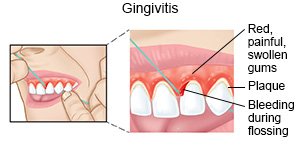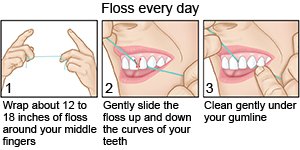Gingivitis
Medically reviewed by Drugs.com. Last updated on Aug 4, 2025.
Gingivitis is mild gum disease caused by plaque that builds up on your teeth and gums. Plaque contains bacteria that can irritate your gums and cause an infection.
 |
DISCHARGE INSTRUCTIONS:
Return to the emergency department if:
- You have new trouble swallowing.
Call your dentist if:
- You have a fever.
- Your gums bleed every time you brush or floss your teeth.
- Your gums hurt when you touch them.
- You cannot use a toothbrush or dental floss because of the pain.
- You have a sore or lump on your gums that stays for over 3 weeks.
- You have 1 or more loose teeth.
- Your face or neck is swollen.
- You have questions or concerns about your condition or care.
Prevent or manage gingivitis:
Gingivitis may lead to a more serious form of gum disease called periodontitis. Periodontitis can cause other dental problems, and you may even may even lose your teeth. Gingivitis may come back if you do not care for your teeth properly at home. The following can help prevent gingivitis or prevent it from getting worse between dental visits:
- Brush your teeth 2 times each day to remove plaque. Brush for at least 2 minutes. Use fluoride toothpaste. A battery-powered toothbrush may remove plaque better than a regular toothbrush. Your dentist can help you decide on the right toothbrush for you.
- Floss your teeth at least 1 time each day. Use dental floss to clean between and around each tooth.

- Use dental rinse, if directed. A dental rinse helps reduce plaque and decrease swollen gums. Ask your dentist which kind to use.
- Get regular checkups. See your dentist regularly for dental cleanings and oral exams.
- Do not smoke. Nicotine and other chemicals in cigarettes and cigars can prevent treatments for gum disease from working. Ask your healthcare provider for information if you currently smoke and need help to quit. E-cigarettes or smokeless tobacco still contain nicotine. Talk to your provider before you use these products.
Treatment options
The following list of medications are related to or used in the treatment of this condition.
Follow up with your dentist as directed:
Write down your questions so you remember to ask them during your visits.
© Copyright Merative 2025 Information is for End User's use only and may not be sold, redistributed or otherwise used for commercial purposes.
The above information is an educational aid only. It is not intended as medical advice for individual conditions or treatments. Talk to your doctor, nurse or pharmacist before following any medical regimen to see if it is safe and effective for you.
Learn more about Gingivitis
Treatment options
Care guides
Further information
Always consult your healthcare provider to ensure the information displayed on this page applies to your personal circumstances.
